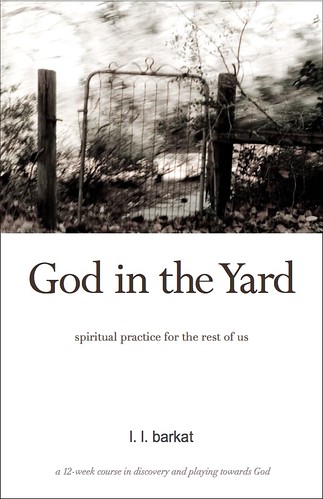Floating Free

In his controversial book No God but God, muslim Reza Aslan suggests that all great faiths are good stories.
Whatever truths religious myths "convey have little to do with historical fact. To ask whether Moses actually parted the Red Sea, or whether Jesus truly raised Lazarus from the dead, or whether the word of God indeed poured through the lips of Muhammad, is to ask totally irrelevant questions. The only question that matters with regard to a religion and its mythology is 'What do these stories mean?'"
On the one hand, I agree. Whatever the story of my faith means, it had better be good. It should have the allure and the passion and the power to transform my life.
Yet, on the other hand, I completely disagree with Aslan.
Indeed, I find the incredulous question of atheist Sam Harris apt in reply, "How is it that, in this one area of our lives [faith], we have convinced ourselves that our beliefs about the world can float entirely free of...evidence?"
For if I'm going to live a mature Christian life, saying no to temptations and yes to the work of justice and grace, there will be much at stake. And I have to admit that I wouldn't stake my life on any old story, even a really good one.
Otherworldly photo by Gail Nadeau. Used with permission.
Seedlings Invitation: If you write a post related to this post and Link It Back Here, let me know and I'll link to yours.
RELATED MATERIAL:
Mark Roberts' The Quantity and Quality of Textual Variants
Labels: philosophy, Story















23 Comments:
LL,
What a great commentary - you're touching on a profound truth. In some religions, it may not matter that the "story" is mythical as long as the moral or ethic of the story is deemed worthy.
However, this isn't, and can never be true of the Christian faith because it rests on a Person and Event. If Jesus Christ didn't exist or isn't who He claimed to be, all of his teaching is meaningless...if the crucifixion didn't happen, it invalidates the entire Christian faith.
Thanks for drawing our attention to this.
Thank you for visiting my blogsite. I really like your commentary. I have many discussions with my brother about such things. He is a born-again atheist and a Richard Dawkins fan.
I am just someone who struggles with my faith, but keeps on going because I can't really do any other.
Preach it, girl.
Every Square... yes, as much as I find the writings of Hinduism (for instance) fascinating and inspiring, it always struck me that they are not rooted in history. In fact, there is a suspicion for history in that faith. Christianity, on the other hand, is rooted in history. As such, it can to some degree be "validated" or "invalidated."
Lorenzo... you are very welcome. And thanks for stopping by. I like that you keep going with your faith.
On the other hand, I once wrote a piece in which I commented, "Many atheists say, 'Faith is dangerous.' I agree. Faith can be dangerous, depending on who or what is the object of our faith. Consider the tragedy under Jim Jones." I still agree with many atheists. Faith can be dangerous. That's why I think we need a faith that does not float free of evidence.
Andrea... wow. I hadn't really considered that I was preaching!
It might be interesting to be able to ask Aslan to comment on Jim Jones in the light of his suggestion that all great faiths are good stories, and what would make a faith qualify as great?
Here's something else to throw into the discussion in light of Aslan's point that religion has little to do with historical fact. What is the difference between fact and truth? And if we do not have all the "facts" to back up our faith (though there is a lot of "evidence to support the Bible), but if we do not have ALL the facts, does that mean our faith is not true? And if two competing stories both claim to be true, does the greatness of the story somehow overshadow the significance of the contradiction?
Great post, LL. I LOVE this ongoing conversation about story.
If Jesus Christ didn't exist or isn't who He claimed to be, all of his teaching is meaningless...if the crucifixion didn't happen, it invalidates the entire Christian faith.
I think you could safely consider "love your neighbour as yourself" to be meaningful, resurrection or not. I realise, though, that that is not necessarily the centre of the Christian faith.
On the other hand, I can only consider those who believe the Bible to be true in every word to be guilty of dogmatic insanity. It really does contradict itself. Honestly. In a book that size by multiple authors it would have taken a miracle that obviously didn't happen to avoid contradictions.
lynet,
I think L.L., is referring to the logical argument proposed by C. S. Lewis.
Essentially, Lewis said Jesus claimed to be God. There are only three ways we can take such a claim.
1) He was a liar. (He is not God and he knows he is not).
2) He is insane. (He is not God and does not know he is not.)
3) He is telling the truth.
According to Lewis, if Jesus is a lying about being God, that invalidates his "good teachings." Similarly, if Jesus is deluded about being God, that invalidates his "good teachings."
If we agree that his teachings are good, and if we agree that the New Testament is a reliable historical document, then it follows that Jesus was probably who he said he was.
Some theologians have wondered if maybe we did not understand what Jesus was saying about himself. Others have argued that the New Testament is not historically reliable (an especially problematic stance, I think, since these same people accept much less credible documents as historical). And there are the theologians who claim Jesus did not say the things we think he said. (A spin off of questioning the historicity of the New Testament.)
I'm no theologian. But I have chosen to believe in the Bible--despite my own doubts at times--because it the most noble thing I can believe.
No other story I know admits so clearly that humans cannot perfect themselves or earn their way into the presence of God.
As to the contradictions. I actually revel in them. The multiple perspectives of the four gospels tell me that it is okay to pick up on different details. Mark and Matthew don't remember everything the same. But they get the main points right. That means I don't have to worry so much about being exact in every detail. As long as I stay focused and centered on the primary truth of who God is, I can relate to Him and other people in ways that are appropriate.
Whew. Long comment.
Mark,
Yeah, well predicted -- I take the 'legend' stance.
Others have argued that the New Testament is not historically reliable (an especially problematic stance, I think, since these same people accept much less credible documents as historical).
There are all sorts of modern accounts that I also don't consider to be credible -- such as Jose Luis de Jesus Miranda's claim to be the antichrist.
Given that some of the gospels talk about some events that no-one could have been there to hear, and other events that non-believers surely would have noticed, had they happened, such as the earthquake in Matthew 27 and darkness until three in the afternoon in Luke 23, there seems to me to be very little doubt that that the gospel authors made some stuff up. We just don't know how much.
Luke almost certainly had Mark as a source. Why'd he leave out "My God, my God, why have you forsaken me?" and replace it with "Father, into your hands I commend my spirit"? Did he have another source that he considered more credible? But if Luke didn't consider Mark to be credible.... Maybe Jesus said both, but it's more likely that Luke made it up because he felt like it fit in with his story better.
But if the gospel authors made some things like that up, then Lewis' careful scrutiny of Jesus words, and his verdict that they don't sound like the words of a madman, hardly makes sense. Jesus' words, like the facts surrounding Jesus' life, probably went through many mouths and many re-workings of memory before they were recorded, and they were definitely bent by the story that each of the gospel authors considered themselves to be telling.
I'd hazard a guess that the supposedly 'less credible documents' that I might accept as historical wouldn't be recordings of an oral tradition with a story powerful enough to bend facts.
L.L.
Well, you just said it with such conviction, and so well.
Craver... I like that question... what qualifies as a great faith? And why? I hope to do a post on what makes the Christian faith a great story, but this wouldn't answer the question of whether it's a great faith.
Charity... it seems to me that Christianity has an emphasis on "truth." And truth, I wager, includes, but is not limited to, facts. Personally, I need at least a respectable body of facts to believe anything that claims to offer truth for my life.
Lynet... I agree that "love thy neighbor" is a worthy statement regardless of who says it. Whether the person who says it is worthy of giving up one's entire livelihood or identity for is a wholly other question. Surely, my 7 year old is capable of making such a statement, but I don't think it would garner her such a massive following anytime soon. (Gosh, I hope not anyway!)
Overall, I tend more towards your arguments for accuracy than (sorry Mark!) Mark's revel with differing details. A long time ago, when I was really trying to sort all this out, I did a lot of research in many directions, including reading the sacred writings of other major religions. At some point the body of facts "tipped" in the direction of faith in Christ.
Since then, I've read the bible through many times. And the sense of unity, particularly at the linguistic level (I'm learning Hebrew and Greek now), is truly astonishing to me. I fancy myself a fairly good writer, but I see such genius and a carry-through of threads in the bible, that I am humbled at its textual feet.
I also agree that it would be problematic if the gospel writers simply made things up. What kind of faith that claims such an emphasis on truth would be so bold as to found itself on utter lies? So, I think it's important to search the gospels to see if indeed they smack of falsehood, at both the "facts" level and the intention level, and additionally at the impact-on-lives level. Just my opinion.
Mark... I agree that Christianity is a most noble thing, particularly when practiced according to the Beatitudes. Now, how do You define noble? (Oh great English teacher and writer of noble poetry. :)
Andrea... a lovely compliment. Thanks!
To me, it either is all true and He is God and totally in control (even of my lost blog) or He isn't - and if He isn't, none of this really would matter, would it?
and if He isn't [in control], none of this really would matter, would it?
My life has meaning. Only the meaning I and others give it, but meaning nevertheless.
And things matter. They matter to me, they matter to you, they matter to everyone.
So I have to disagree with you, there.
Lynet, I definitely agree that Lewis' logic is not the end all be all that a lot of Christians make it. I just got carried away on a comment. That happens sometimes. Hope it didn't feel like an attack. It wasn't meant that way at all.
My friend Mark Roberts has some really good stuff about this exact argument over on his blog. And he is brilliant.
I wasn't thinking of you as accepting less credible documents as historical, but the Jesus Seminar folks. Sorry about that confusion. It was perfectly clear in my head. : )
I am currently reading a book called, Doubt, by Alister McGrath, which speaks to so many issues that have come up in this discussion: the historical facts of Christianity, contradictions or discrepancies in the Bible, the identity and significance of Jesus.
The book is written from a Christian perspective, but I think he has a couple of points that might add something here.
"The beliefs that are really important in life concern such things as whether there is a God and what he is like, or the mystery of human nature and destiny. These--and a whole host of other important beliefs--have two basic features. In the first place, they are relevant to life. They matter, in that they affect the way we think, live, hope and act. In the second place, by their very nature they make claims that cannot be proved (or disproved) with total certainty. At best we may hope to know them as probably true. There will always be an element of doubt in any statement that goes beyond the world of logic and self-evident propositions."
The author, of course, is not suggesting that our belief be free of evidence, just that even with all the evidence we have, there are still holes and gaps. This is where our faith in Jesus or our faith in something else moves us beyond the evidence to conviction of truth.
Mark,
Hope it didn't feel like an attack. It wasn't meant that way at all.
I read atheist blogs. We argue like cats, even with each other (in the name of vigorous civilized discourse, naturally). I'm not offended :-) On the contrary, I suspect I have merely slipped into the style of the atheist blog land in my response.
My friend Mark Roberts has some really good stuff about this exact argument over on his blog. And he is brilliant.
www.markdroberts.com? I just googled it. You're right, from my initial brief skim, it's definitely worth reading.
Charity,
The author, of course, is not suggesting that our belief be free of evidence, just that even with all the evidence we have, there are still holes and gaps. This is where our faith in Jesus or our faith in something else moves us beyond the evidence to conviction of truth.
Do you need conviction? If so, is that because, after having decided that Christianity is truthful enough to be worth following, you then see that Jesus demands that you have conviction? Or is it just for personal reasons? Or both?
Or have I read you wrongly? Perhaps you consider it perfectly natural to progress from tentative support based on evidence to full conviction helped along by faith. Is my view that you would need a strong reason to do that a place where my viewpoint differs from yours?
A book I recently read, The Things They Carried also brought up a lot of interesting questions about happening-truth vs. story-truth. I'm finding those questions to be critical to understand what Christianity in a postmodern culture means, and my temporary-conclusion is that in Jesus, story-truth and happening-truth intersect as the ultimate reality. I blogged about it a while back: Happening Truth vs. Story Truth.
Lynet -- Oh, you are such an insightful person, and your questions are so good.
Perhaps you consider it perfectly natural to progress from tentative support based on evidence to full conviction helped along by faith.
First, let me say that I have been a Christian for 24 years and picked up a book on doubt. That may say something about how my spirituality progresses. It's more like fits and starts rather than an acceleration or continuous growth. If there is some progression, however, it is simply because I have found the evidence lacking for all belief systems as a way to have full assurance. Believing or not believing in anything requires some faith, and I have been persuaded by many factors of the truth of Christianity -- in faith.
Do you need conviction? If so, is that because, after having decided that Christianity is truthful enough to be worth following, you then see that Jesus demands that you have conviction? Or is it just for personal reasons? Or both?
I can't recall in Jesus' teaching that he ever demands my conviction. He demands my faith, my love, my obedience, my sacrifice -- but I don't think he demands my conviction. In fact, he told Thomas the doubting disciple that blessed are those who don't see and still believe. Maybe this creates a logical fallacy (I don't have evidence that the basis of my faith is true because the basis of my faith says that it's more blessed not to have evidence), but it also seems to ring true about the very essence of faith in general.
I think I have a conviction about the truth of my beliefs because I have seen God using those truths to change me from the inside. I know this is where the discussion could get really illogical, so I'll just leave it at that. But maybe a better way of saying it is that the external evidence of historical accuracy of the Bible, and the internal evidence of faith and love produced in my spirit, have worked together to form a conviction of the supremacy of Jesus.
Well, that's much longer than I intended, but the questions were so good and really made me think. I am so grateful for your willingness to enter these conversations with us, Lynet. I am learning a lot from you!
I have found the evidence lacking for all belief systems as a way to have full assurance.
That sentence almost seems to assume that evidence is lacking if you do not have full assurance.
It's scary to face up to lack of evidence on which to base your life, and it's true that we all tend to have extra attachment to such deep beliefs because we have so much riding on them, but I would never aim for full assurance, myself (although I wouldn't refuse it if good reason for it came up). I try to combat false assurance. Doubt is a virtue!
As you've noted, however, the gospel isn't really with me on that one:
I can't recall in Jesus' teaching that he ever demands my conviction . . . . In fact, he told Thomas the doubting disciple that blessed are those who don't see and still believe.
In other words, while he doessn't necessarily demand conviction, there is direct praise of belief without evidence, there.
I am so grateful for your willingness to enter these conversations with us, Lynet. I am learning a lot from you!
Thanks. I'm learning a lot, too. There are a lot of fruitful thoughts on and around this blog.
LL - I really resonated with your poinst: And I have to admit that I wouldn't stake my life on any old story, even a really good one. I wouldn't either. That's one thing I love about the dimension that Lynet has been bringing through her questions and responses (I don't mean to be talking about you as if you're not here, Lynet!). It's not enough just to say the story of the Bible is a good story and base my entire worldview on it. While you can come to Christ with a "simple faith", I think we should continue to question what we believe and why we believe it. And so far, I've found that the Bible holds up to my scrutiny.
I've really enjoyed lurking in this conversation because I'm learning so much from everyone's points of view and haven't felt any need to chime in with my own -- mostly because I don't have anything to say at this point that would help revolutionize a perspective or cast a different light.
I did, however, catch the wave Charity and Lynet have just caught about the role of doubt in our faith. While I don't know that I'd go so far to say that doubt is a virtue, I would definitely agree that doubt is a necessary and acceptable and welcome part of life. It's something I believe is welcome inside Christianity, too.
The reason I say this is because of the way Christ received all of those who came to him. They came from every cross-section of life, and pretty much none of them had it together. Yet the only ones he got indignant toward -- furious, really -- were those who put forth a glossy, have-it-all-together and all-figured-out exterior, the Pharisees. Everyone else he received as they were and never condemned them for it. (And even Nicodemus, one of the high Pharisees, was accepted when he came to Jesus in the night with all his questions.) So even though Jesus praises the faith of children and tells Thomas it is more blessed to believe than to see, I think there's still room in the spirit of his teachings and his very actions to "bring it" from wherever we find ourselves. Because the other thing peppered throughout the Bible is the primacy of the heart as the fount of our life -- it's the place the indicates where we REALLY are, even if our minds and actions try to prove otherwise.
L.L., Great take on this. I concur completely. Probably truth in what the writer is saying, but not enough truth to stake our lives on if the story is simply true to who we are.
In Christianity and in Christ we're told we can stake our lives on it because of the reality of it; the story itself is true in a way that is unique, and therefore can take us into that story to become a part of it in a personal, engaging way.
Thanks!
Post a Comment
<< Home